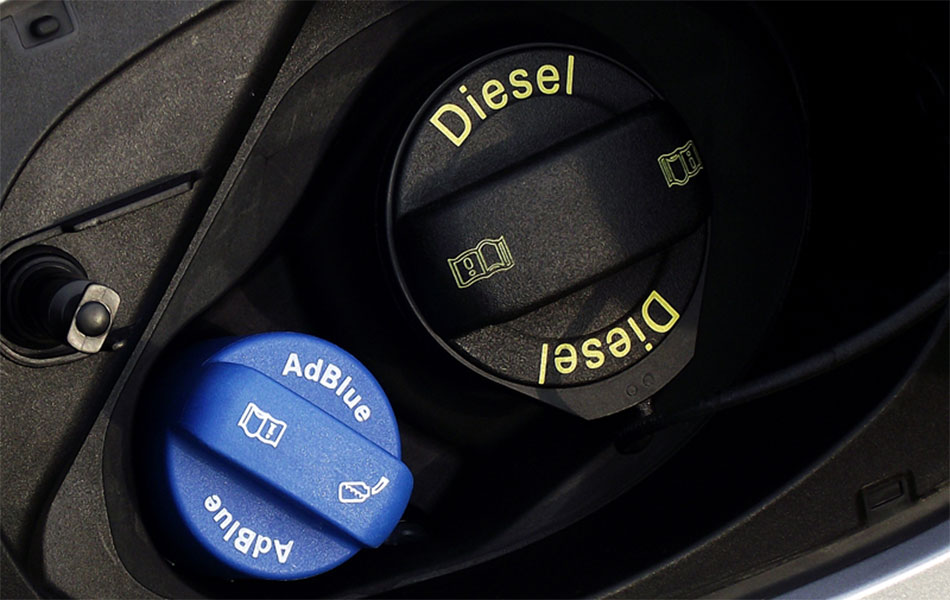
Putting AdBlue® into your diesel fuel tank is very problematic because AdBlue® is not a fuel, but rather a urea-based solution (typically 32.5% urea and 67.5% deionized water) designed specifically for selective catalytic reduction (SCR) systems in modern diesel engines to reduce harmful emissions, particularly nitrogen oxides (NOx).
AdBlue® is not a fuel and doesn’t have the same properties as diesel. If you put AdBlue® into the diesel fuel tank, it can cause the following issues:
- Clogging and corrosion: AdBlue® can clog the fuel system, including injectors and fuel lines, because it’s corrosive to certain materials used in fuel systems.
- Engine malfunction: Since AdBlue® is not combustible like diesel, putting it in the fuel tank can prevent proper combustion in the engine, leading to misfires, poor performance, or total engine failure.
- Fuel system damage: The AdBlue® solution can damage critical fuel components such as the fuel pump, filters, and injectors. These parts may become blocked or corroded.
- Clogged filters: The diesel particulate filter (DPF) and other parts of the exhaust system could be impacted because the urea solution could crystallize and create blockages in various components of the emissions system.
SYMPTOMS
If you start the engine with AdBlue® in the fuel tank, the vehicle may still run initially, but it will soon experience serious issues. Diesel engines depend on the proper fuel-air mixture for combustion, and AdBlue will not contribute to that process. Running the engine with AdBlue in the diesel system could:
1. Engine Misfire or Rough Idle:
- Symptom: The engine may start to misfire, run roughly, or shake when idling.
- Cause: AdBlue® is not a fuel, so it doesn’t burn like diesel does. This disrupts the combustion process, causing poor engine performance. Misfiring occurs because the engine is trying to burn something that isn’t meant to be combusted in a diesel engine.
2. Loss of Power:
- Symptom: You may experience a significant drop in engine power, acceleration issues, or sluggish performance.
- Cause: AdBlue® does not provide the energy necessary for the engine to operate at full power, so the engine may struggle to produce sufficient power, particularly under load or when accelerating.
3. Stalling or Difficulty Starting:
- Symptom: The vehicle may stall unexpectedly, or it may be difficult to start the engine after turning it off.
- Cause: AdBlue® in the fuel tank prevents the proper fuel combustion needed to keep the engine running, which can cause it to stall. The engine may also struggle to start because the incorrect mixture in the fuel system makes it harder to initiate combustion.
4. Fuel System Warning Lights:
- Symptom: Warning lights will likely illuminate on the dashboard, such as the Check Engine Light (CEL) or Fuel System Warning.
- Cause: The vehicle’s sensors (including the fuel pressure sensor and others) will detect that the fuel is not correct, triggering fault codes. These codes are related to engine performance, fuel system issues, or emissions, depending on your vehicle’s system.
5. Exhaust System Issues:
- Symptom: If the vehicle is driven long enough with AdBlue® in the fuel tank, the exhaust system may be affected.
- Cause: AdBlue® is designed for use in the Selective Catalytic Reduction (SCR) system, not in the combustion chamber. If the engine runs with AdBlue® in the fuel, the exhaust may produce abnormal emissions. The SCR system may also become flooded with urea, leading to possible damage or clogging.
6. Fuel System Contamination:
- Symptom: If you run the engine with AdBlue® for a prolonged period, the fuel injectors, fuel pump, and other parts of the fuel system could be damaged.
- Cause: AdBlue® is corrosive to certain components in the fuel system, and if it is introduced to the diesel fuel lines, it can cause the components to degrade, clog, or become damaged.
7. Unusual Engine Noises:
- Symptom: You may hear strange sounds like knocking, pinging, or other unusual engine noises.
- Cause: Because AdBlue® doesn’t combust properly, the fuel mixture is incorrect, which can lead to knocking, detonation, or other abnormal sounds from the engine as it tries to burn an improper fuel mix.
8. White Smoke from the Exhaust:
- Symptom: The exhaust may emit white or excessive smoke.
- Cause: AdBlue® is primarily water and urea. If it makes its way into the combustion chamber or exhaust, it may cause the engine to emit white smoke as it attempts to burn the incorrect substance. This could also be a result of the engine struggling to clear the urea from the combustion process.
If your fuel system is contaminated with AdBlue® the fuel tank will need to be fully drained and the fuel system flushed and thoroughly cleaned. If the vehicle has been driven it more likely than not will result in expensive repair costs associated with replacement of numerous fuel system parts and components.
Due to the complications we have had with AdBlue®, we can only assist and help you with this issue if the vehicle has NOT been started.
If the vehicle has been started, we recommend you take your vehicle to a qualified mechanic for these repairs to be carried out.

